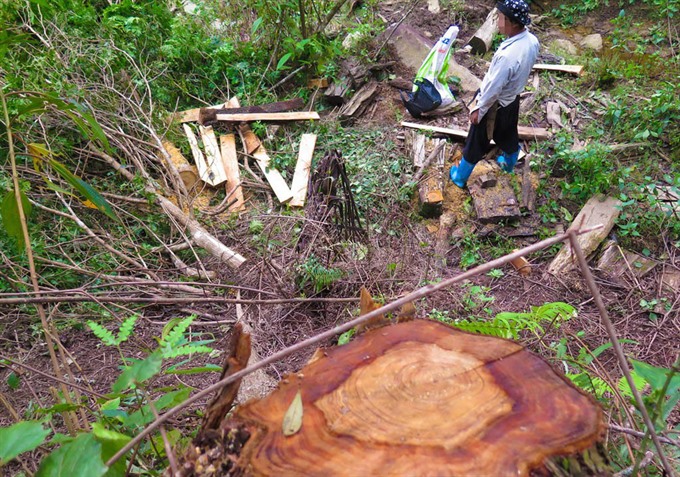[ad_1]
Residents of Bản Mù Commune in Trạm Tấu District, one of most disadvantaged areas in the mountain province of Yên Bái, have often relied on the illegal felling of valuable timber from the pơ mu tree (Fujian Cypress) to make ends meet.

The pơ-mu (Fujian cypress) forest in Yên Bái Province once protected water resources and prevented soil erosion, but in recent years, it has become exploited to the point of destruction. — Photo tuoitre.vn
But now that the final stands of big trees have been chopped down and sold, the poverty rate in the mostly Mông population has hit about 78 per cent.
Sùng A Lù, chairman of the commune People’s Committee, claimed that timber trafficking in the region had ceased because there were no more pơ-mu trees.
The commune was notorious for illegal logging and trading. Pơ-mu forest once protected water resources, and prevented soil erosion, according to Tuổi trẻ (Youth) newspaper.
Reporters spent days convincing a local to show them the way to the forest area where pơ-mu trees still survived. The 45-year-old man said he used to be an illegal logger, but for the last 10 years, had turned to farming.
The group walked for half a day in the forest to reach the felled pơ-mu trees, which have a stong perfume that can be smelled from 100 metres away. The banks of streams that flow through the area are littered with roots and branches of pơ-mu.
In the bad old days, loggers built tents to live in while they hacked away at the precious timber, waiting for rain so they could float their stolen goods out of the forest.
“Pơ-mu is valuable. A kilo of pơ-mu costs VNĐ 1,500 -2,000 but timber slabs from the tree trunks cost much more,” a logger named Xính said, adding that the illegal trade earned men about VNĐ 4000,000 -500,000 a day each.
Another logger said that when there were many big trees, they chose ones near the streams so that they could be transported easily.
“Now, no big trees are left. We have to dig up the roots of big trees. Small trees are also being chopped down,” he said.
The timber is gathered at the edge of the forest and carried by motorbikes at night to purchasers.
To buy illegal timber, a must-have wide-ranging relationships. Each has his own territory which is defined clearly.
In Bản Mù Commune, a buyer named Đông is quite famous. He said he spent a lot of money to open a workshop storing and processing illegal pơ-mu in the commune.
He told reporters that under the heaps of sawdust on the side of the workshop were tens of cubic metres of pơ-mu hidden.
Đông said that he moved his workshop from Nghĩa Lộ District to Bản Mù Commune because Nghĩa Lộ ran out of pơ-mu.
“My workshop looks small, but without relationships [with local authorities], dare you open?,” Đông said, adding that other would-be buyers one tried to open up, but soon closed.
In favourable conditions, especially after rice harvest, he employs about 30 people at his workshop. They process up to 10 tonnes of raw timber a day, he said.
Another notable buyer in Trạm Tấu District is Thúy, a woman who says: “When you are in Yên Bái and have any timber business, call me!”
Thúy’s worshop specialises in pơ-mu which is often processed to make beads for mats or beaded car-seat covers.
The beads are hidden in packages labeled as animal feed or fish feed or noodles.
Thúy said that she sold tens of tonnes of pơ-mu beads monthly.
Đông said it was difficult to hide pơ-mu on buses because of its dense scent.
Đông said that he sold hundreds of tonnes of pơ-mu beads to an agent in Nghĩa Lộ District yearly for VNĐ 20,000 per kilo.
The agent is responsible for transportation and would fix any problems if detected.
Tuổi trẻ (Youth) newspaper found that as soon as pơ-mu beads arrived in Nghĩa Lộ District, they would be strung together to make car seat covers or beaded bracelets. On average, a completed beaded mat costs VNĐ4 million and a seat cover VNĐ 2 million.
The products often cross borders in Lào Cai or Lai Châu to reach China. — VNS
[ad_2]
Source link
